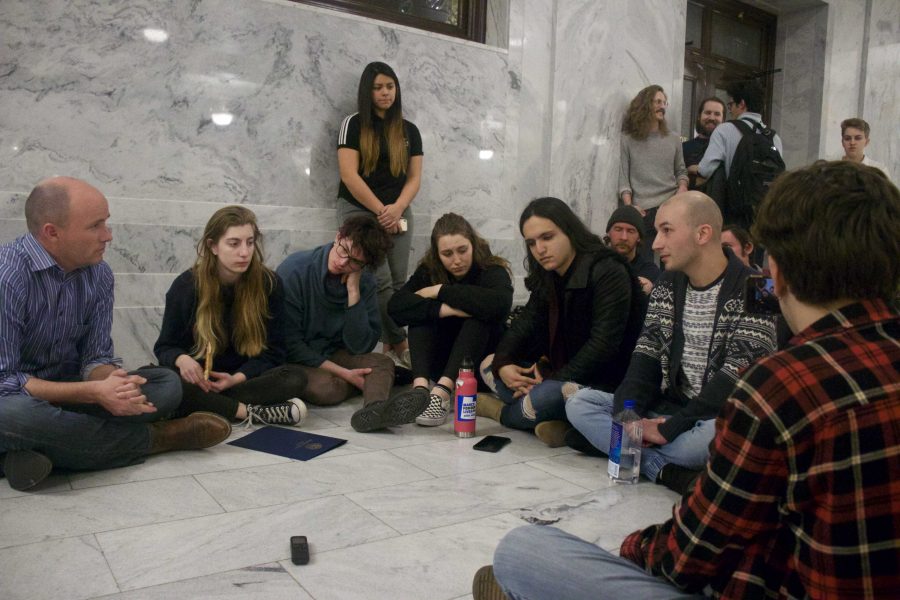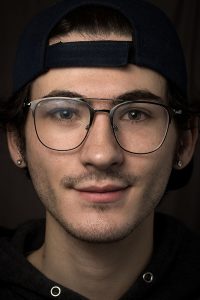Dalley: Gay Former Conversion Therapists Can Keep Their Apologies to Themselves
Lieutenant Gov. Spencer Cox sits with LGBTQ youth protesting conversion therapy outside of the governor’s offices at the Utah Capitol | Chronicle archives.
October 3, 2019
Conversion therapy is attempting change a person’s sexual orientation or gender identity or expression. Also known as “reparative” therapy, conversion therapy employs a variety of techniques to “correct” LGBTQ+ people, such as ice cold showers, social isolation, physical pain and even electroshock treatment. This practice has been proven to not work and often causes great harm to the victims of the practice.
According to a 2018 study from Dr. Caitlin Ryan of the Family Acceptance Project, victims of conversion therapy are “associated with elevated young adult depressive symptoms and suicidal behavior and with lower levels of young adult life satisfaction, social support and socioeconomic status.” The study also states that victims experience at least twice the average rate of depression and are a shocking 63% more likely to attempt suicide.
The American Psychological Association Task Force on conversion therapy found that survivors of the practice experience decreased self-esteem, elevated self-hatred and psychological distress. These internal struggles of being inauthentic to themselves often lead them to a higher risk of high-risk sexual behaviors and substance abuse. The task force concluded that “enduring change to a person’s sexual orientation is unlikely and potentially harmful” and that no empirical evidence or peer-reviewed research has found that same-sex orientation is caused by family dysfunction or trauma.
Despite the strong evidence that conversion therapy does not work and is demonstrably harmful, this regressive practice is still happening today. This is becoming increasingly apparent from the many stories of individuals, including myself, who have been victims of the practice.
Over the past year, two top former conversion therapists have come out as gay themselves. The first being David Matheson, a Utah counselor who practiced conversion therapy pitched as reparative therapy. Matheson was a member of The Church of Jesus Christ of Latter-day Saints (a faith infamous for its anti-LGBTQ rhetoric) and played an essential role in educating other Latter-day Saint therapists in Utah on how to respond to LGBTQ clients through LDS Family Services.
In an interview with The Salt Lake Tribune, Matheson is quoted as saying, “I realize now that, alongside the very valuable work I did, I also perpetuated some judgments that had caused me shame … through some of the therapeutic practices that I now regret using.” Matheson claims to be “heartbroken” at the idea that he brought pain to other men with similar struggles. Matheson also wrote in a Facebook post that he has no plans to renounce his faith or past work. Even so, when I met Matheson, he stated that he does support banning conversion therapy for youth in Utah.
Just last week, news broke that McKrae Game, the founder of Hope for Wholeness Network, a faith-based conversion therapy program in South Carolina, also came out as gay. Game has profusely apologized in interviews, saying “I was a religious zealot that hurt people. People said they attempted suicide over me and the things I said to them.” Game stated later that he knows that he has caused many countless acts of harm has been and is currently trying to identify all of the ways he did wrong. “People, I know, are in therapy because of me,” said Game. “Why would I want that to continue?”
While both men are apologetic to varying degrees, their apologies do not matter. Their apologies have not healed the psychological harm the practice caused to me. The insecurities I feel within my own being and within my relationships, the body shame, the anxiety surrounding food, how I walk, how I dress, how I talk and how I generally relate to the world. Their apologies do not negate my own suicide attempt, just as their apologies cannot bring back my friends that were victims of conversion therapy who have now passed away from suicide. Their apologies do not heal broken families. Their apologies, while perhaps sincere, only assuage their own guilt.
It is not my responsibility to alleviate that guilt, nor is it the responsibility of the LGBTQ community. The fact is, Matheson and Game are alive, and they get to be in relationships, they get to speak about their experiences, even though many of their victims do not. Their guilt is theirs to own, and their apologies mean nothing. If they want their apologies to ever mean something, they must unequivocally disavow the practice and tirelessly work to end the practice in every state and every country that is so willing to abuse LGBTQ people.








